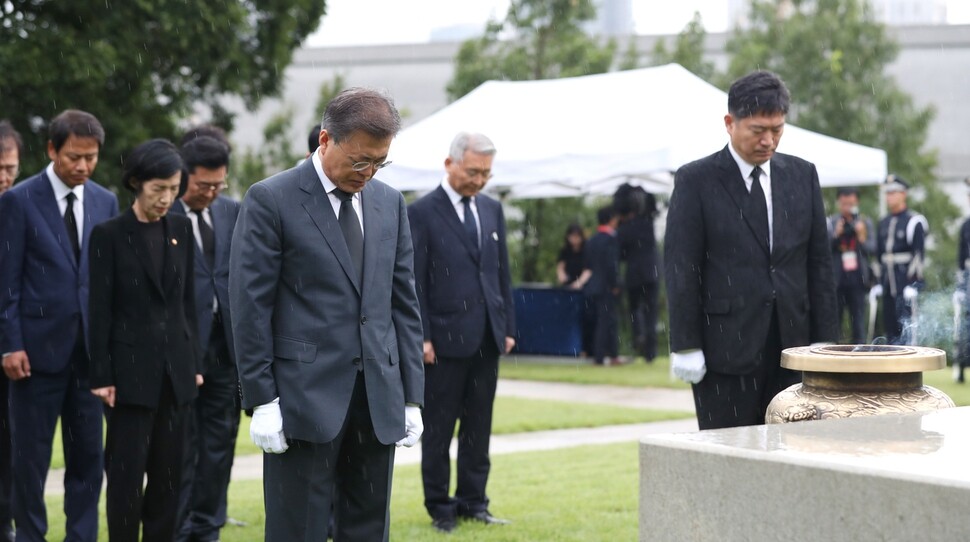hankyoreh
Links to other country sites 다른 나라 사이트 링크
[Editorial] President Moon emphasizes need for peaceful solutions in Liberation Day address

During an address on Aug. 15 marking the 72nd anniversary of Korea’s liberation from Japanese colonial occupation, South Korean President Moon Jae-in declared to both international and domestic audiences his commitment to preventing war and finding a peaceful solution to issues on the Korean Peninsula. In addressing the recent showdown between North Korea and the US, Moon stated, “There must not be another war on the Korean Peninsula. The government will do everything it can to prevent war.” This made clear Moon’s opposition to the recent “war of words” between the US and North Korea.
In a comment aimed at the US, Moon emphasized that “military action on the Korean Peninsula is a course of action that can be decided by South Korea alone, and no one can decide to take military action without the consent of South Korea.” The comment served as a firm declaration that the South Korean government would not tolerate military action of any kind from which it was excluded.
“The North Korean nuclear issue must be resolved peacefully, no matter how complicated that process may be. On this point, South Korea and the US are on the same page,” Moon said. This was consistent with remarks made the previous day, when he said that “the South Korea-US alliance is designed to keep the peace.”
While reaffirming the Berlin Declaration that he announced last month, Moon once again urged North Korea to respond to his proposal for dialogue. “We cannot depend solely on our allies for our security. We must take the initiative in resolving issues on the Korean Peninsula,” he said. In regard to North Korea, he suggested that the two sides “start with the easy things,” including reunions of families divided by the Korean War and participation in the 2018 Winter Olympics in Pyeongchang.
By reiterating [South Korea’s] leadership on peninsular issues and emphasizing dialogue with North Korea despite changes in the security situation since the Berlin Declaration was announced, Moon made clear that he will not be backing down.
Moon’s commitment to a peaceful solution is even more credible since it comes right when North Korea and the US appear to be each taking a step back. On Aug. 14, North Korean leader Kim Jong-un said he would “keep an eye on the Americans’ behavior” after the US Secretaries of State and Defense expressed a willingness to negotiate with the North. Given these circumstances, it is regrettable that Moon did not proactively seek a breakthrough by devising a bolder solution to the North Korean nuclear issue, perhaps by proposing to send a special envoy to North Korea on Liberation Day.
On the issue of South Korea-Japan relations, Moon said, that [the two countries] “should not be hobbled by issues of history and of the past.” He promised to “expand various kinds of exchange, including shuttle diplomacy,” indicating that he will be treating historical issues separately from urgent matters of security and the economy. But Moon also called on Japan to sincerely shift its stance on the Koreans who were forced to become sex slaves known as “comfort women” and those who were pressed into hard labor during World War II. “The Japanese leaders need to boldly change their position,” Moon said.
The fact that Moon rejected calls to rename “Liberation Day” as “Government Establishment Day” on the first Liberation Day since the “Candlelight Revolution” is also of particular import. “2019 will be the 100th anniversary of the foundation of the Republic of Korea and the establishment of the Korean Provisional Government,” Moon said. This statement is significant in that it corrects repeated efforts by conservative governments over the past nine years to distort history by defining Aug. 15, 1948, as the day when the government was established. Such a move would delegitimize the Korean Provisional Government, which was based in Shanghai [during Japan’s colonial rule of Korea].
Please direct questions or comments to [english@hani.co.kr]

Editorial・opinion
![[Column] Park Geun-hye déjà vu in Yoon Suk-yeol [Column] Park Geun-hye déjà vu in Yoon Suk-yeol](https://flexible.img.hani.co.kr/flexible/normal/500/300/imgdb/original/2024/0424/651713945113788.jpg) [Column] Park Geun-hye déjà vu in Yoon Suk-yeol
[Column] Park Geun-hye déjà vu in Yoon Suk-yeol![[Editorial] New weight of N. Korea’s nuclear threats makes dialogue all the more urgent [Editorial] New weight of N. Korea’s nuclear threats makes dialogue all the more urgent](https://flexible.img.hani.co.kr/flexible/normal/500/300/imgdb/original/2024/0424/7317139454662664.jpg) [Editorial] New weight of N. Korea’s nuclear threats makes dialogue all the more urgent
[Editorial] New weight of N. Korea’s nuclear threats makes dialogue all the more urgent- [Guest essay] The real reason Korea’s new right wants to dub Rhee a founding father
- [Column] ‘Choson’: Is it time we start referring to N. Korea in its own terms?
- [Editorial] Japan’s rewriting of history with Korea has gone too far
- [Column] The president’s questionable capacity for dialogue
- [Column] Are chaebol firms just pizza pies for families to divvy up as they please?
- [Column] Has Korea, too, crossed the Rubicon on China?
- [Correspondent’s column] In Japan’s alliance with US, echoes of its past alliances with UK
- [Editorial] Does Yoon think the Korean public is wrong?
Most viewed articles
- 1‘We must say no’: Seoul defense chief on Korean, USFK involvement in hypothetical Taiwan crisis
- 2N. Korean delegation’s trip to Iran shows how Pyongyang is leveraging ties with Moscow
- 3‘Weddingflation’ breaks the bank for Korean couples-to-be
- 4Korea sees more deaths than births for 52nd consecutive month in February
- 546% of cases of violence against women in Korea perpetrated by intimate partner, study finds
- 6Will NewJeans end up collateral damage in internal feud at K-pop juggernaut Hybe?
- 7[Column] Park Geun-hye déjà vu in Yoon Suk-yeol
- 8[Editorial] New weight of N. Korea’s nuclear threats makes dialogue all the more urgent
- 9Amnesty notes ‘erosion’ of freedom of expression in Korea in annual human rights report
- 10“Parental care contracts” increasingly common in South Korea